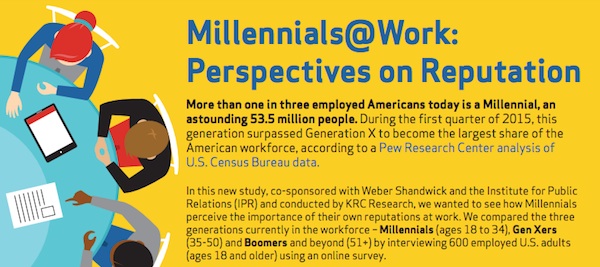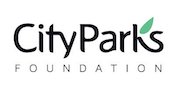Millennials exhibit an acute awareness of their professional reputations, and place a greater value on face-to-face interactions and socializing with co-workers than their senior peers, according to a survey conducted by Weber Shandwick with the Institute for Public Relations.
The survey, titled “Millennials at Work: Perspectives on Reputation,” analyzed U.S. workers belonging to the Millennial, Generation X and Baby Boomers generations, and gauged the similarities and differences each place on reputation in the workplace.
The study found distinct differences in the qualities workers aged 18-34 consider important to maintaining good reputations at work, with a particular emphasis on the roles networking and socializing play in maintaining those reputations.
The survey indicates Millennials place a far higher emphasis on workplace reputations when compared to their senior colleagues. Nearly half of Millennials polled — 47 percent — said they think about their professional reputations “all or most of the time,” almost twice the number of Baby Boomers — 26 percent — who admitted exhibiting the same degree of reputational anxiety. More than any generation, 59 percent of Millennials believe a person’s reputation is established within their first month on the job.
These beliefs continue outside the office. Millennials place a far greater emphasis on in-person interactions and socializing with coworkers during off hours than any other generation polled. More than a third — 34 percent — of Millennials surveyed believe meeting with colleagues outside the office can have a positive affect on someone’s professional reputation, compared to 14 percent of GenXers and 15 percent of Baby Boomers. One in five Millennials surveyed — 20 percent — said not being social outside of work can serve as a detriment to someone’s reputation, three times the number of Baby Boomers —7 percent — who agreed with this.
Perhaps not surprising, Millennials’ use of digital media as a tool for enhancing professional reputation revealed more disparity than any other category in the survey. Millennials place a uniquely high value on using digital media as a means for projecting a positive reputation, with 12 percent claiming that being active on social media can help them build a good professional reputation, compared to 3 percent of GenXers and 4 percent Baby Boomers. GenXers and Baby Boomers are also more likely to believe —73 percent and 72 percent, respectively — that their work reputations are more important than their social media reputations, while 70 percent of Millennials agreed to this. More than any other generation polled, 21 percent of Millennials find work and social media reputations to be equally important.
However, Millennials appear less aware about the perils of workplace gossip than their senior peers. Only 64 percent of Millennials stated that they believe making negative statements about coworkers could potentially damage their own reputations, a contrast to the 74 percent of GenXers and 79 percent of Baby Boomers who believe this. By contrast, more Millennials than any other generation — 37 percent — believe that being too competitive can damage one’s professional reputation, compared to only 29 percent of GenXers and 28 percent of Baby Boomers who agreed to this.
Millennials this year surpassed GenXers as the most represented demographic in the U.S. workforce, according to a recent Pew Research Center analysis of U.S. Census Bureau data. More than 53 million Americans — about a third of all U.S. workers — now belong to the generation
The Weber Shandwick/IPR survey was conducted with KRC Research, and consisted of online interviews with 600 employed U.S. adults.
The survey can be found here.


 Navigating the delicate balance between the art of perception and the science of strategic communication is paramount for fostering a positive corporate reputation.
Navigating the delicate balance between the art of perception and the science of strategic communication is paramount for fostering a positive corporate reputation. City Parks Foundation is looking to hire a firm to handle PR connected to its arts programming, which includes New York City’s largest free outdoor festival, SummerStage.
City Parks Foundation is looking to hire a firm to handle PR connected to its arts programming, which includes New York City’s largest free outdoor festival, SummerStage. Sacramento seeks a PR firm to develop a multi-media campaign to generate awareness of its Cannabis Opportunity Reinvestment and Equity program.
Sacramento seeks a PR firm to develop a multi-media campaign to generate awareness of its Cannabis Opportunity Reinvestment and Equity program. Fathers are drastically losing market share, particularly to mothers, but also to grandmothers and even to teenage babysitters and complete strangers.
Fathers are drastically losing market share, particularly to mothers, but also to grandmothers and even to teenage babysitters and complete strangers. Management's behavior and the ways in which organizations impact society are now widely responsible for our perceptions of companies, according to a global study released by FleishmanHillard. (7 reader comments)
Management's behavior and the ways in which organizations impact society are now widely responsible for our perceptions of companies, according to a global study released by FleishmanHillard. (7 reader comments)


 Have a comment? Send it to
Have a comment? Send it to 
No comments have been submitted for this story yet.